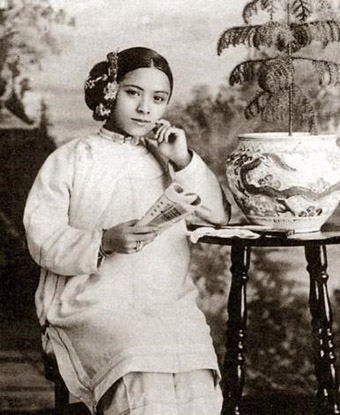Last updated: January 28, 2022
Person
Tye Leung Schulze

Tye Leung was a civil rights and community activist born in San Francisco’s Chinatown in 1887. Like many in the neighborhood, her family was not rich and the house was crowded. She lived with her parents, 7 siblings, and her elderly aunt and uncle. Growing up, she and her siblings experienced segregation at an early age: local law forced Chinese Americans into separate schools. After elementary school, there were few options for a girl like Leung. She found a place, however, at the Presbyterian Mission under the tutelage of Donaldina Cameron, a teacher and local activist.
In 1899, her parents arranged a marriage for Leung's older sister to a much older man in Montana. Not willing to accept this match, her sister ran away with her boyfriend and left their parents in a tight spot. Unfortunately for Leung, her parents’ solution was for 12- or 14-year-old Tye Leung to take her sister's place (sources differ on her age). Resisting, Leung ran to the only place that she felt safe: the Presbyterian Mission. Cameron regarded Leung as an escaping slave, and provided a new place for her to live and learn. Soon, Leung became a star pupil of Cameron’s and worked with her as a translator and interpreter in court as the Mission worked to free Chinese women from sex slavery.
Perhaps due to these experiences, Leung decided to take the civil service exam and in 1910, she became the first Chinese woman employed by the federal government. Assigned to the Angel Island Immigration Station, she worked in the women's quarters on the island and acted as a translator for detained Chinese immigrants.[1] On May 19, 1912, she made news once again as she became the first Chinese woman to vote in the United States (and perhaps the first Chinese woman to cast a vote, worldwide). She voted in that year's presidential primary, along with other California women who were enfranchised by the state in 1911. After voting, Leung Schulze was interviewed about her experience and declared:
"My first vote? - Oh, yes, I thought long over that. I studied; I read about all your men who wished to be president. I learned about the new laws. I wanted to KNOW what was right, not to act blindly...I think it right we should all try to learn, not vote blindly, since we have been given this right to say which man we think is the greatest...I think too that we women are more careful than the men. We want to do our whole duty more. I do not think it is just the newness that makes use like that. It is conscience"
While at Angel Island, Leung met Charles Schulze, the man who would become her husband. He worked as an Immigration Service Inspector. In 1913, anti-miscegenation laws banned intermarriage between whites and Asians. Undeterred, the couple went to Washington State where interracial marriage was allowed, and got married there. Upon their return to California, both were forced to give up their jobs at Angel Island. With some difficulty, they found other work and lived together in California until Charles’ death in 1935.
His death left Tye to raise their children alone. She found work as a bookkeeper with the San Francisco Chinese Hospital and later as a night-shift operator with Pacific Telephone’s Chinatown exchange. She also provided translation services for members of the Chinese community in San Francisco, becoming a community fixture. Once the games were introduced to Chinatown in the 1930s, Leung Schulze made a reputation for herself as a local pinball wizard.
In her later years, Leung Schulze continued working as a community advocate in San Francisco. At the age of 61, she was arrested for allegedly driving women to abortion clinics. In December 1948, after an investigation and trial, the charges against her were dropped. Tye Leung Schulze lived in San Francisco until her death in March, 1972.
Notes:
[1] The Angel Island Immigration Station, located on Angel Island in San Francisco Bay, was added to the National Register of Historic Places on October 14, 1971 and designated a National Historic Landmark District on December 9, 1997.
Sources:
Berson, Robin K. Marching to a Different Drummer: Unrecognized Heroes of American History. Greenwood Press, 1994.
Dunn, Lia “Immigrant Voices: Interpreter, Voter, and Pinball Aficionado.” Angel Island Immigration Station Foundation, https://www.immigrant-voices.aiisf.org/
“Two Women Freed in De John Abortion Inquiry.” San Francisco Chronicle, 15 Dec. 1948.
Yung, Judy. Unbound Voices: A Documentary History of Chinese Women in San Francisco. University of California Press, 1999. [Includes a first-person account of her life by Tye Leung Shulze]

